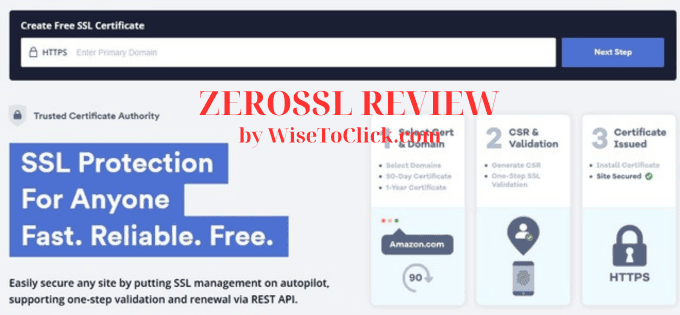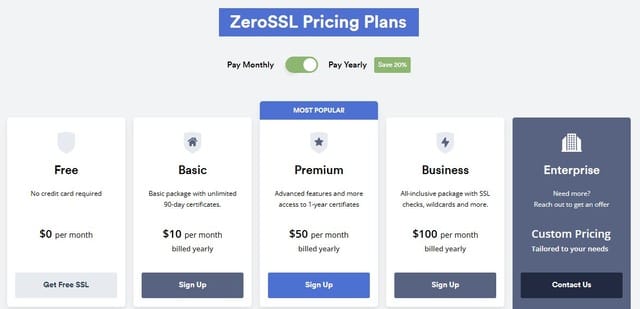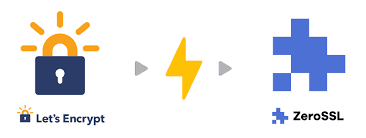ZeroSSL is a popular platform for obtaining free and paid SSL certificates. It offers a user-friendly interface and automated tools to simplify the process of securing your website. Here’s a breakdown of its key features, pros and cons, pricing plan, compare to alternative:
ZeroSSL Review – Key Features:
ZeroSSL offers a compelling set of features that make it a popular choice for website security. Here are some of its key features:
Free SSL Certificates:
- 90-day validity: Provides a good starting point for securing your website at no cost.
- Easy issuance: Obtain free SSL certificates quickly and easily through their user-friendly interface.
- Automated renewals: Simplify certificate management with automated renewal reminders and processes.
Paid SSL Certificates:
-
- Wildcard certificates: Secure multiple subdomains with a single certificate.
- Extended Validation (EV) certificates: Enhance trust and credibility with the highest level of SSL validation.
- Multi-domain certificates: Protect multiple domains with one certificate.
Tools and Features:
- Intuitive dashboard: Manage all your certificates and account settings in one central location.
- ACME integration: Automate certificate issuance and renewal using popular ACME clients like Certbot.
- REST API: Integrate ZeroSSL with your applications and workflows for seamless certificate management.
- Certificate transparency: Ensure transparency and security by logging issued certificates in public logs.
- SSL monitoring: Track the status and expiration dates of your certificates to avoid unexpected downtime.
Additional Benefits:
- Fast issuance: Obtain SSL certificates quickly, often within minutes.
- Strong encryption: Utilize industry-standard encryption algorithms to protect sensitive data.
- Browser compatibility: ZeroSSL certificates are trusted by all major web browsers.
- Affordable pricing: Offers competitive pricing for paid SSL certificates and plans
ZeroSSL Review – Pros and Cons:
Pros:
- Free SSL Certificates: ZeroSSL is well-known for providing free 90-day SSL certificates, making it a cost-effective option for basic security needs.
- Easy-to-Use Interface: Their website and dashboard are designed with user-friendliness in mind, making it simple to generate and manage certificates even for beginners.
- Automated Certificate Management: ZeroSSL automates many aspects of certificate issuance and renewal, saving you time and effort.
- ACME Support: It supports the Automated Certificate Management Environment (ACME) protocol, enabling automatic issuance and renewal using tools like Certbot.
- Variety of Certificate Types: In addition to free SSL, they offer a range of paid certificates, including wildcard certificates and extended validation (EV) certificates.
- API Access: Developers can integrate ZeroSSL into their applications and workflows using their API.
Cons:
- Short Validity Period for Free Certificates: The 90-day validity of free certificates requires more frequent renewals.
- Limited Support for Free Users: Free users have access to basic support resources, but premium support options are reserved for paid plans.
- Some Negative Reviews: Some users have reported issues with unauthorized charges or difficulties with customer support.
ZeroSSL Review – Pricing:
ZeroSSL offers a range of pricing options to cater to different needs and budgets. Here’s a breakdown of their pricing structure:
ZeroSSL Free Plan:
- Cost: Free
- Features:
- 3 free 90-day SSL certificates per account
- Basic SSL management tools
- Automated domain validation
- ACME support
ZeroSSL Paid Plans:
- ZeroSSL offers a variety of paid plans with different features and pricing tiers. These plans generally include:
- Longer validity periods: 1-year SSL certificates are standard.
- ore certificates: Issue more certificates per year depending on the plan.
- Wildcard certificates: Secure multiple subdomains with a single certificate.
- Extended Validation (EV) certificates: Enhance trust with high-assurance certificates.
- Priority support: Get faster response times and dedicated support channels.
- API access: Integrate ZeroSSL with your applications and workflows.
ZeroSSL Pricing Tiers:
Key Considerations:
- Free vs. Paid: The free plan is a great option for basic needs and testing, but paid plans offer more features and flexibility.
- Certificate Types: Consider the types of certificates you need (e.g., wildcard, EV) when choosing a plan.
- Number of Certificates: If you need to secure multiple domains or subdomains, factor in the number of certificates included in each plan.
- Support Needs: If you require priority support or API access, a paid plan is necessary.
ZeroSSL’s pricing is generally competitive within the SSL certificate market. Their free plan is a valuable option for those starting, while their paid plans offer a good balance of features and affordability for businesses and individuals with more demanding needs.
ZeroSSL vs Let’s Encrypt
Both ZeroSSL and Let’s Encrypt are popular Certificate Authorities (CAs) that offer free SSL certificates, but they have some key differences:
ZeroSSL
- Free Plan: Offers 3 free 90-day certificates per account. Paid Plans: Provides various paid plans with longer validity, more certificates, and advanced features like wildcard and EV certificates.
- User Interface: Has a user-friendly web interface for managing certificates.
- ACME Support: Supports ACME protocol for automated issuance and renewals.
- API Access: Offers API access for integrating with applications.
- Support: Provides basic support for free users and premium support for paid users.
Let’s Encrypt
- Free Only: Focuses solely on providing free SSL certificates.
- No Paid Plans: Does not offer any paid plans or premium features.
- Command-Line Focused: Primarily uses command-line tools like Certbot for certificate management.
- ACME Only: Relies exclusively on the ACME protocol for issuance and renewals.
- No Web Interface: Does not have a web interface for managing certificates.
- Community Support: Relies on community forums and documentation for support.
Here’s a table summarizing the key differences:
| Feature | ZeroSSL | Let’s Encrypt |
|---|---|---|
| Free SSL | Yes (90-day) | Yes (90-day) |
| Paid Plans | Yes | No |
| Certificate Types | DV, Wildcard, EV | DV only |
| User Interface | Yes | No |
| ACME Support | Yes | Yes |
| API Access | Yes | No |
| Support | Basic & Premium | Community |
| Renewal Process | Automated or manual | Automated (usually via Certbot) |
| Validation Methods | HTTP, DNS, Email | HTTP, DNS |
Which one is right for you?
ZeroSSL:
- If you need a user-friendly interface.
- If you want the option of paid plans with more features.
- If you need API access for integration.
Let’s Encrypt:
- If you only need free DV certificates.
- If you’re comfortable using command-line tools.
- If you’re okay with community-based support.
Ultimately, the best choice depends on your specific needs and preferences. Both ZeroSSL and Let’s Encrypt are reputable CAs that provide reliable SSL certificates to secure your website
Overall, ZeroSSL is a solid choice for individuals and businesses looking for an easy and affordable way to secure their websites with SSL certificates. Their free SSL option is particularly attractive for basic needs, while their paid plans offer more advanced features and support.



